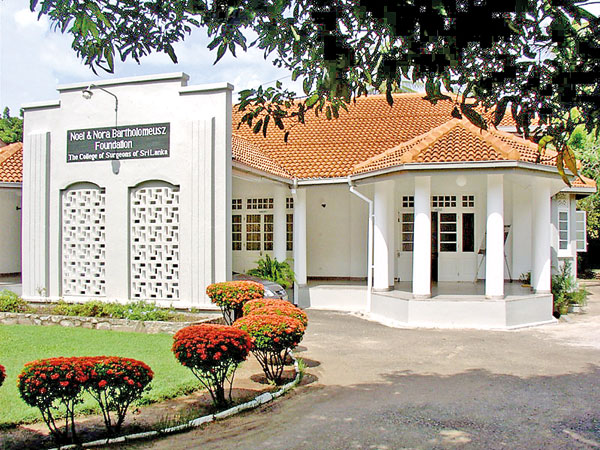Sunday Times 2
Overview of surgical services in Sri Lanka
It is opportune to review Sri Lanka’s progress of surgical services since Independence in 1948. Seven decades and three years have elapsed and where do we rate in terms of similar services in advanced economies? Have we achieved equity of access to the island’s population of such services both from a geographic and affordability point of view?
Is access to sophisticated surgical care, in situations where complex surgical problems pose a threat to life, as in those patients with multiple co-morbidities, available? Is the availability of supportive care services that make survival dependent on, like ICUs, available in areas away from Colombo? These are metrics that we as surgeons should reflect critically on the occasion of the golden jubilee of the College of Surgeons of Sri Lanka.

The new head office building of the College of Surgeons of Sri Lanka
To be frank, the kudos for life expectancy, which has reached almost 77 years, close upon that of the west (UK 80-83 years), must go to the Ministry of Health. Due to successful public health programmes, specifically those of immunization, we do not see malaria, cholera, dysentery, polio, tetanus and diphtheria. These rampant killers have become a thing of the past. This is a major achievement. Yet, viral disorders such as tuberculosis remain to be tamed. It is a reality that we see non-communicable diseases — the major cause of morbidity and mortality — in the forefront of health related issues, as is seen in the west.
To those of us seniors, we see the sharp contrast from our childhood experience of almost not seeing unattended cleft lips and palates, club feet in children and adults. If at all a set of birth defects exist, they are mostly those related to the heart.
As for injury (trauma), road traffic accidents remain a massive issue draining both the health purse and leaving often young adults maimed for life, if they manage to survive. The ambulance facility, ‘Suwasariya-1990’, has been a real boon in this context, bringing those injured early to hospital. Speaking from almost five decades of personal experience, even though this problem requires many stakeholders, it is possible to start whittling on it.
Based on evidence of priority issues, I would recommend a far stricter surveillance of drunk driving and driving under the influence of narcotics. Vigilance of licensing authorities, a probationary period of two years for new licencees to see if they behave according to road rules with punitive deterrents and a greater check on driver’s eligibility to drive are some of the measures required to be implemented. Many accidents involving long distance bus/lorry drivers are a result of tight schedules and lack of proper rest. Well furbished rest rooms at depots for drivers will go a long way in rectifying this imminently correctable issue. These are starters in dealing with the problem. Road quality, lighting, vehicle fitness and many others measures should follow.
In terms of care for the injured, accident and emergency facilities are now available in most teaching hospitals. But here again some, such as the one in Kandy, are yet embroiled in litigation related to construction. Care is now well triaged, with sub-specialised surgical services for orthopaedic trauma, neuro-trauma, vascular and plastic surgery reinforcing the general surgical care. However prevention is less costly in terms of life and rupees.
Infective surgical disorders which were rampant once upon a time — such as polio, tetanus, diphtheria and gas gangrene requiring surgical intervention — are now rare or absent, thanks mostly to immunisation programmes. Defects, as in mal-united fractures and delays in seeking surgical attention due to beliefs in alternative medicine have also dwindled, giving an opportunity to effectively combat infective disorders early with better results.
What we now see are disorders related to wear and tear. Much like in the West, the longer lifespan has necessitated support for organs due to the effects of age-related change in their joints requiring artificial replacement. Weight bearing joints, like the hip and the knee, are common problems: Likewise, in the blood supply of the organs. For which we offer bypass surgery, stents and even replacement if indicated, by the transplant for the organ concerned. Routine kidney transplants, less often liver transplants with a beginning for heart transplants are now made available.
Ageing also affects the immune defence system, hence cancer cells which arise in us, are not effectively removed by these defences. However, they are well handled by the Onco-surgical fraternity. We fall short only on, not instituting islandwide screening programmes for certain cancers like that of the breast and the cervix. Unfortunately the dominant cancer which can be largely prevented — i.e. oral and possibly food-pipe cancer — requires the ‘bulath habit’ to be removed for good.
Surgical training that confers such advances has improved by leaps and bounds. The Post-Graduate Institute of Medicine of the University of Colombo has been in the forefront, keeping pace with advances in the international arena. Our exit qualification, MD Surgery, is recognised for entry to the Royal College of Surgeons UK post-graduate surgical programmes at an equivalent level. The College of Surgeons of Sri Lanka plays a great role in this respect, offering a multiplicity of facilities for hands-on training as well as lectures, workshops and master-classes in the spectrum of surgical specialities. These programmes have been sustained for the past several decades. They have benefitted the community that we live in without much ado, making quality surgery available and accessible to all Sri Lankans.

